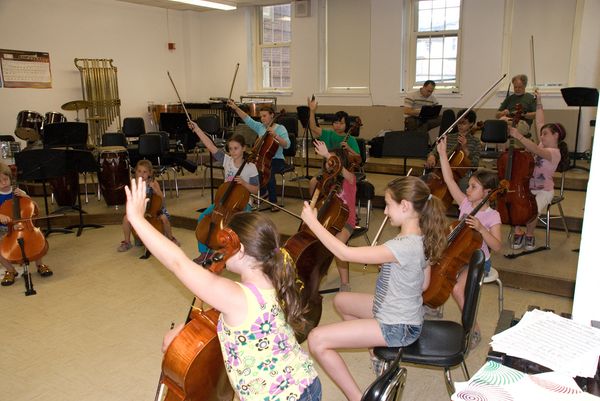
Performance Skills – Performing for others on a regular basis gives students an opportunity to develop the state of mind necessary to perform. Playing pieces they are currently learning reveals spots that need further attention. Playing pieces that are well learned and ready for performance gives the student the chance to see whether or not their technique provides enough stability for consistent execution. Most importantly, the type of focus necessary for performing needs to be practiced. It is good to learn how to perform by both memory and while reading music.
Sightreading – Like performing, sightreading is a skill that is best learned under a little bit of pressure. Working along with others, understanding when things are tricky, and getting instant gratification through ensemble pieces fosters a positive relationship with sightreading.
Ensemble Skills – It is important to know how to support your fellow players with your own playing. Sometimes we need to lead, sometimes follow, and sometimes do both. This is the essence of playing chamber music.
Music Theory – String players often do not have the same opportunity to learn music theory as pianists do because we are primarily a single line instrument. Working together as a cello ensemble to explore scales, harmony, rhythm and texture makes learning difficult concepts much more entertaining and memorable.
Synchronized Bowing Patterns – Bowing is the language of string players. Learning the basic vocabulary of the bow is easiest done surrounded by others making the same gestures. Much like dance class, practicing as an ensemble is the quickest way to learn new patterns.
Reinforcing Difficult Cello Technique – There are many aspects of playing a string instrument that are very tricky to grasp such as bow angles, left hand positions, extensions, shifting…. the list is endless. Watching others and participating together in executing short snippets of technique helps students respect the process of acquiring the ability to play this gorgeous instrument.
Develop a Taste for Good Sound – Feel first hand what it is like to contribute your sound to an ensemble and understand the necessity of having command of your tone.
Good Intonation – In the sonorous environment of several cellos playing together, one can feel the thrill of fine intonation. Learning to hear when the intonation is truly blending helps one to find and adjust notes quickly.
Learn New Repertoire – Learn new pieces as others play them. It’s great to listen to fellow students perform pieces they are working on because you can follow their progress and gain an understanding of what goes into learning a particular piece.
Learn to Be a Part of a Supportive Environment – Develop the instinct of being supportive of others. Learn to be a part of an environment where everyone thrives.
